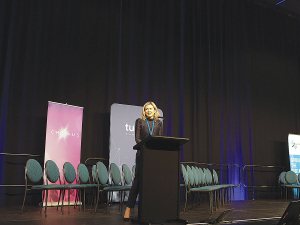Rural NZ faces shift as copper network deregulation looms
Rural communities say support is required to shift away from the copper network that has been the only source of internet connection for some parts of rural New Zealand.
 Anna Mitchell at the recent TUANZ Conference. Photo Credit: Kathleen Mowbray, Rex Studio Photography.
Anna Mitchell at the recent TUANZ Conference. Photo Credit: Kathleen Mowbray, Rex Studio Photography.
Chorus says rural New Zealand is at risk of losing real opportunities if it can’t stay connected.
Chorus’s executive general manager of Fibre Frontier, Anna Mitchell, says the country doesn’t have a long-term plan for rural connectivity.
Her comments come as the broadband network provider prepares to shut down the copper network in all areas where fibre is available.
Mitchell says the copper network, which services rural New Zealand, is aging fast.
“We have a number of pieces of our network that are 40-50 years’ old and they’re showing their age and they’re built for a different era and for different types of technology, and copper’s simply not able to provide what modern consumers will need for the next five, ten, fifteen years,” she told Dairy News.
When the copper network was first set up, it was designed predominantly to service landlines, before subsequently being upgraded to allow for basic broadband services.
“What’s challenging about copper is that it was never really built as a rural technology,” Mitchell says. “It’s intended to be the nationwide network and serve 1.7 million address points.”
She says this has meant that, previously, the urban population would subsidise the more expensive rural conditions, but as people have migrated onto alternatives, such as Voice over IP, wireless internet, and mobile, fewer people have a copper line and it’s becoming difficult to maintain because the network is aging.
Not only is it difficult to find people qualified to fix and maintain the copper network, Mitchell says, but the availability of the parts required is sparse too.
“So, for some of our remote radio technology that serve the copper network, we can only get parts for that if we harvest them from other networks that have failed… so it’s becoming almost impossible to repair.”
Chorus is calling on the Government to undertake a review of the country’s long-term rural connectivity needs.
“We think there’s an opportunity to take fibre further into rural,” Mitchell says, pointing to a New Zealand Institute of Economic Research- Chorus report which stated the benefits of rural households’ access to rural connectivity with unconstrained capacity would amount to $16.5 billion over the course of ten years.
“We need to be funding long-term technologies. So, the investments that went into building the copper network 40 years ago have lasted a really long time, but what we’re seeing with some of the rural broadband initiatives is they are only just meeting current demand and in a lot of places people still have data caps… and you can’t upgrade to higher plans.”
Mitchell says all of this has a significant impact on how people use the internet in terms of things like employment.
“So we see there being a really strong case for not leaving rural communities behind,” she says.
Meanwhile, Minister for Media and Communications Paul Goldsmith has released a discussion document on enhancing telecommunications regulatory and funding frameworks.
He told Dairy News the feedback from that document will be used by the Government to understand what changes are necessary.
“Reliable and resilient telecommunications networks are crucial for our increasingly digital economy, particularly during times of emergency,” Goldsmith says.
“While rural connectivity is arguably the best it has ever been, there are ongoing challenges in delivering affordable connectivity to rural areas.”
NZPork says the Government needs to strengthen its proposed planning laws to ensure New Zealand's pig farmers can continue to produce pork.
Good news for kiwifruit growers - a record crop with forecast per hectare returns at record levels for all fruit categories for the 2025-26 season.
As guests gathered on what is known as the Speaker's Lawn - a beautifully manicured patch of grass behind the main buildings of Parliament - to mingle and enjoy a lamb chop to celebrate National Lamb Day, the mood was very much upbeat.
Global dairy prices are on a roll, recording a fourth consecutive jump on the Global Dairy Trade (GDT) auction this year.
Booming primary sector exports are helping lift earnings for farm service providers.
The world is waking up to the disadvantages of carpets derived from petrochemicals, creating opportunities for New Zealand strong wool.
OPINION: Staying with politics, with less than nine months to go before the general elections, there’s confusion in the Labour…
OPINION: Winston Peters' tirade against the free trade deal stitched with India may not be all political posturing by the…